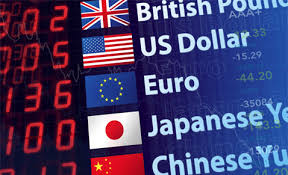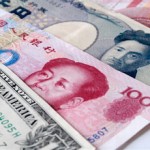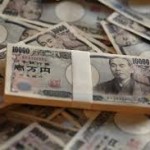Yen Falls Toward Seven-Year Low as Spending Slides; Aussie Drops

The yen tumbled toward a seven-year low and two-year Japanese government bond yields slid below zero after data showed household spending fell and inflation slowed.
The yen headed for a monthly loss of at least 1.6 percent against all its 16 major peers amid speculation the Bank of Japan will keep expanding stimulus further. The euro dropped for a second day versus the dollar before a report forecast to show the region’s inflation matched the slowest pace since 2009. The Aussie fell and the Norwegian krone and Canadian dollar extended losses after OPEC members left the output target unchanged amid oil’s slump into a bear market.
“As dollar buying continues on the back of falling oil prices, the yen is getting sold on higher stocks with an extra boost from the CPI,” said Kengo Suzuki, chief currency strategist at Mizuho Securities Co. in Tokyo. “The inflation numbers could stoke expectations for further BOJ easing.”
The yen tumbled 0.5 percent to 118.31 per dollar as of 1:42 p.m. in Tokyo, approaching the seven-year low of 118.98 reached last week. The Japanese currency fell 0.4 percent to 147.27 per euro. The euro declined 0.2 percent to $1.2448.
The yield on two-year Japanese sovereign debt dropped one basis point, or 0.01 percentage point, to minus 0.005 percent.
Inflation Outlook
The BOJ’s key price gauge increased 2.9 percent in October from a year earlier, today’s data showed, equivalent to a 0.9 percent gain when the effects of April’s tax bump are excluded. Retail sales dropped 1.4 percent from September, more than a 0.5 percent decline forecast in a Bloomberg News survey.
In Europe, inflation probably slowed to 0.3 percent this month, according to economists in a separate Bloomberg survey before today’s report. That would match the rate in August and September, which was the lowest since October 2009.
The Bloomberg Dollar Spot Index, which tracks the U.S. currency against 10 major counterparts, rose 0.3 percent to 1,102.84, on track for its highest close since March 2009. It has gained 0.3 percent this week.
“The U.S. dollar remains strong,” said Imre Speizer, a markets strategist at Westpac Banking Corp. in Auckland, adding that sentiment toward the yen remains bearish. “The data coming out of the euro zone continues to be weak, and points to more quantitative easing from the ECB.”
Commodity currencies continued their decline after OPEC took no action to ease a global oil-supply glut amid oil’s tumble into a bear market this year.
Australia’s dollar slid 0.5 percent to 85.00 U.S. cents. The krone weakened 0.3 percent to 6.9491 per dollar, after tumbling 1.4 percent yesterday. Canada’s loonie fell 0.2 percent to C$1.1349 per U.S. dollar, adding to yesterday’s 0.7 percent drop.
Source: Bloomberg – Yen Falls Toward Seven-Year Low as Spending Slides; Aussie Drops




























